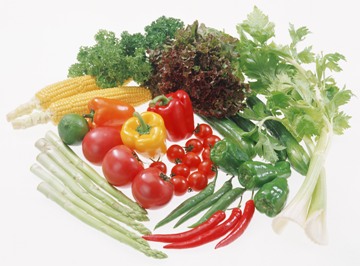
Fiber is a substance found in plants. Dietary fiber -- the kind you eat -- is found in fruits, vegetables, and grains. It is an important part of a healthy diet.
Dietary fiber is a complex carbohydrate and is the part of the plant material that cannot be digested and absorbed in the bloodstream. Soluble fiber may help with weight loss as it makes you feel full longer, and research has shown it also may help lower blood cholesterol. Good sources of soluble fiber include oatmeal, oat bran, barley, dried beans and legumes, and citrus fruits. Insoluble fiber tends to speed up the passage of material through the digestive tract and reduce the risk of colon cancer and diverticular disease. Good sources of insoluble fiber include wheat bran, whole grain cereals, and fruit and vegetable skins.
Health Benefits of Fiber
The health benefits of fiber are well documented in reducing the risk of certain diseases. Fiber is linked to reduced risk of cancer, especially colon and breast cancer, and fiber may help lower LDL cholesterol (bad cholesterol) and total cholesterol levels, which have an impact on the risk reduction of heart disease. Fiber also can help in the management of diabetes by reducing blood sugar. Researchers think that roughage increases the production of HDL ‘good' cholesterol, which flushes LDL ‘bad' cholesterol out of the arteries so it can't harden into plaque. Studies have also shown that daily fiber supplementation lowers blood pressure, slashes cholesterol, reduces inflammation, and prevents arteries from hardening.
Eating a higher-fiber diet, as part of an overall healthful lifestyle, may play a role in a healthful BMI ( body mass index). One study found that women who ate more whole grains and total fiber consistently gained less weight over 12 years than those who ate less fiber and whole grains. Another study found that women with low-fiber, high-fat diets were more likely to be overweight than those following high-fiber, low-fat diets. "Weight control advice for American women should place greater emphasis on consumption of fiber," notes one of the study's researchers.
Fiber may reduce the risk of type 2 diabetes. Those who ate a diet high in refined carbohydrates and low in cereal fiber were more likely to increase their risk of type 2 diabetes, according to a recent study. And a recent Finnish study showed that as whole grain and cereal fiber intake increased, the risk of type 2 diabetes seemed to decrease. But it may not just be all about the fiber in this case; high-fiber foods are also rich in important micronutrients. That's why it's better to concentrate on including whole plant foods in your diet than to take a fiber pill or supplement.
A high-fiber diet may reduce your risk of colon cancer. If populations with a low average fiber intake suddenly doubled their fiber by making wiser food choices, they could lower their risk of colon cancer by 40%, according to a study involving data collected from 10 European countries. A recent National Cancer Institute study also linked high fiber intakes to a lower risk of colorectal cancer. This was especially true for fiber from grains, cereals, and fruits.
There are two forms of fiber: soluble and insoluble.
Soluble fiber attracts water and turns to gel during digestion. This slows digestion. Soluble fiber is found in oat bran, barley, nuts, seeds, beans, lentils, peas, and some fruits and vegetables. Soluble fiber has been scientifically proven to lower cholesterol, which can help prevent heart disease.
Insoluble fiber is found in foods such as wheat bran, vegetables, and whole grains. It appears to speed the passage of foods through the stomach and intestines and adds bulk to the stool.
Conditions
- Cholesterol
- Colon cancer
- Diabetes
- Heart health
- High blood pressure
- Weight loss
Recommendations
- The average American now eats 10 - 15 grams of fiber per day. The recommendation for older children, adolescents, and adults is 20 - 35 grams per day. Younger children will not be able to eat enough calories to achieve this, but it is a good idea to introduce whole grains, fresh fruits, and other high-fiber foods.
To ensure that you get enough fiber, eat a variety of foods, including:
- Cereals
- Dried beans and peas
- Fruits
- Vegetables
- Whole grains
Add fiber gradually over a period of a few weeks to avoid abdominal discomfort. Water aids the passage of fiber through the digestive system. Drink plenty of fluids (approximately 8 glasses of water or noncaloric fluid a day).
Peeling can reduce the amount of fiber in fruits and vegetables. Eating fiber-containing food is beneficial, whether it is cooked or raw.
Interactions & Side Effects
- Drink plenty of water to avoid constipation.
- Eating a large amount of fiber in a short period of time can cause intestinal gas (flatulence), bloating, and abdominal cramps. This usually goes away once the natural bacteria in the digestive system get used to the increase in fiber in the diet. Adding fiber gradually to the diet, instead of all at one time, can help reduce gas or diarrhea.
- Too much fiber may interfere with the absorption of minerals such as iron, zinc, magnesium, and calcium. However, this effect usually does not cause too much concern because high-fiber foods are typically rich in minerals.
![]()
Disclaimer: This website is for information purposes only. By providing the information contained herein we are not diagnosing, treating, curing, mitigating, or preventing any type of disease or medical condition. Before beginning any type of natural, integrative or conventional treatment regime, it is advisible to seek the advice of a licensed healthcare professional.



























